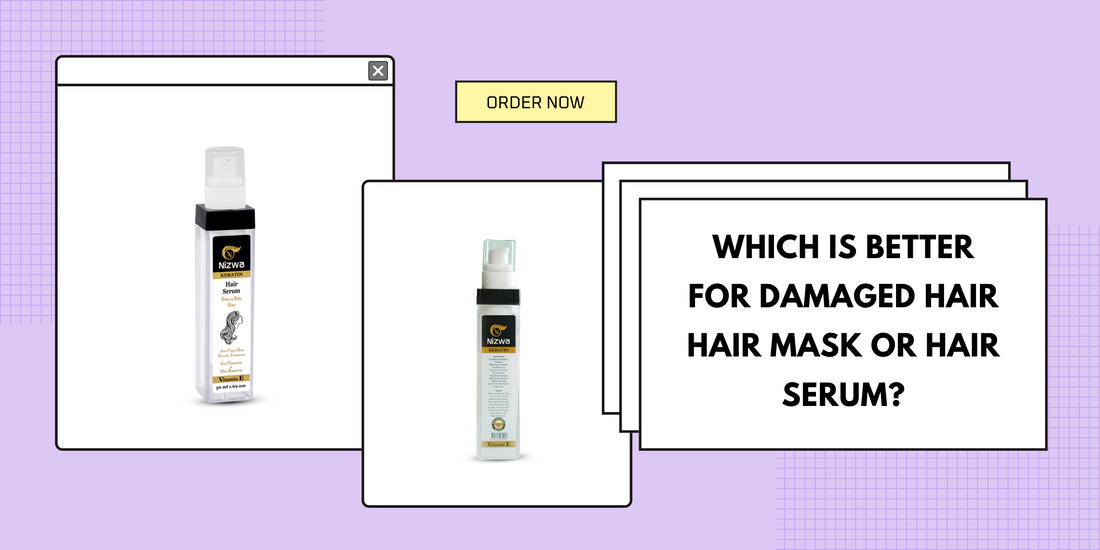
Which is better for damaged hair: hair mask or hair serum?
Dealing with damaged hair can feel like a constant battle. You know the drill: dryness, frustrating breakage, stubborn frizz, and a dull look that just won't shine. It seems like every day brings a new challenge for your locks. Then, you face a huge wall of products, each promising to fix your hair woes. It's easy to feel lost in the beauty aisle.
Among the many options, two stand out as top choices for hair repair: hair masks and hair serums. They're popular for a good reason. But which one is truly better for damaged hair? This question is key for anyone trying to bring their hair back to life. Knowing how each product works is vital. It helps you pick the right one. That way, you get the best results for your damaged hair.
Key Ingredients and Their Benefits for Damaged Hair
The magic of a hair mask comes from its rich ingredients. These work hard to fix what's broken.
- Moisturizing: Ingredients like shea butter, argan oil, and coconut oil are moisture heroes. Hyaluronic acid also pulls water into your hair. They replace lost hydration. This makes dry, brittle hair feel soft again.
- Protein and Keratin: Your hair is mostly protein. So, adding keratin or other proteins helps a lot. These ingredients strengthen the hair shaft. They fix damage from the inside out. They also make your hair more stretchy and less likely to snap.
- Vitamins and Antioxidants: Look for Vitamin E, biotin, and plant extracts. These feed your scalp and hair. They protect your hair from more damage. This includes harm from the sun or pollution.
When to Use a Hair Mask
Hair masks are for serious hair issues. They aren't for daily use.
- Intensive Repair: Use a mask if your hair is very dry. It's also perfect for brittle, chemically treated, or heat-damaged hair. They give deep help when your hair needs it most.
- Weekly or Bi-Weekly Treatments: Masks fit best into a regular hair care plan. Use one once a week or every other week. This keeps your hair strong and healthy over time.
- Pre-Wash Treatment: For best absorption, try putting a mask on before you shampoo. This lets the good stuff soak in before cleansing. Then, your hair is ready for deep repair.
Decoding Hair Serums: Lightweight Protection and Shine
Hair serums offer a different kind of help. They are light and focus on the hair's surface.
Key Ingredients and Their Benefits for Damaged Hair
Serum ingredients create a shield and add shine.
- Silicones (e.g., Dimethicone, Cyclomethicone): These ingredients are like a clear coat for your hair. They form a protective layer. This smooths down the hair's outer layer, called the cuticle. It greatly cuts down on frizz and makes your hair look super shiny.
- Lightweight Oils (e.g., Argan Oil, Jojoba Oil): Some serums have lighter oils. These give a touch of moisture. They make your hair easier to manage. Best of all, they don't make your hair feel heavy or greasy.
- UV Filters and Heat Protectants: Many serums offer extra protection. They guard against sun damage. They also shield your hair from hot styling tools. This stops further harm to fragile strands.
Important Link: Hair serum vs. hair oil – which is better for growth?
When to Use a Hair Serum
Serums are great for daily hair needs. They are your go-to for quick fixes and protection.
- Daily Styling and Protection: Serums are perfect for everyday use. They tame frizz. They add a healthy glow. They also create a layer against heat and the environment.
- On Damp or Dry Hair: You can use serums on wet hair before styling. This helps with detangling and heat protection. You can also use them on dry hair. This calms flyaways and adds instant shine.
- Targeting Specific Concerns: Some serums are made for special jobs. There are serums for color protection. Others target frizz. Some are only for heat styling. Pick one that fits your main hair problem.
| Feature | Hair Mask | Hair Serum |
|---|---|---|
| Primary Function | Deep repair & nourishment | Surface protection & shine |
| Key Ingredients | Proteins (keratin), oils (argan, coconut), vitamins | Silicones, lightweight oils, UV filters |
| Best For | Severely dry, brittle, chemically/heat-damaged hair | Frizz control, shine, daily styling, heat/sun protection |
| Application | Weekly or bi-weekly, pre/post wash | Daily use, on damp or dry hair |
| Effect Duration | Long-term repair with consistent use | Instant results, short-term protection |
| Ideal User | Someone needing intense repair & strength | Someone wanting daily smoothness & protection |
Can You Use Both Hair Masks and Hair Serums? The Synergy Effect
Absolutely! Using both a hair mask and a hair serum can give you the best of both worlds. They work well together.
Complementary Benefits
Imagine giving your hair a complete overhaul. A hair mask repairs damage inside the hair. Then, a serum protects the outside. This combination addresses both internal issues and external styling needs. For example, you might use a deep conditioning mask. This helps your hair drink up moisture. Afterward, apply a serum to damp hair. This seals in that moisture. It also shields your hair from heat styling. Plus, it cuts down on frizz.
Order of Application
To get the most from both products, follow a simple order:
- Wash your hair with shampoo.
- Apply the hair mask. Let it sit for the recommended time.
- Rinse the mask out thoroughly.
- Gently towel-dry your hair until it's damp.
- Apply the hair serum to your damp hair.
- Style your hair as usual.
Important Link: What happens if you stop using hair serum? (Before & After)
Choosing the Right Combination for Your Hair Type
Picking the right mask and serum depends on your hair. Think about its porosity. Is it thick or thin? What specific damage do you want to fix? For very damaged hair, a protein-rich mask is good. For fine hair, a lighter serum is better.
Actionable Tip: Always try new products on a small piece of hair first. Watch how your hair responds. This helps avoid problems.
Reviews (User Experience)
Sana (Frizzy Hair)
"Living in Karachi’s humidity is tough on my hair. Serums with silicones are a lifesaver for frizz, but I use a moisturizing mask once a week to keep my strands strong."Hira (Heat-Styled Hair)
"I straighten my hair almost every day. A hydrating serum with heat protection keeps it from breaking, but the real game changer is my keratin hair mask every Sunday."
Conclusion: Making the Best Choice for Your Damaged Hair
Both hair masks and hair serums are excellent tools for damaged hair. They just do different jobs. Hair masks offer deep repair and restoration from the inside out. Hair serums provide surface treatment, shine, and protection from external harm.
So, which is better? The truth is, it depends on what your hair needs most. If your hair needs serious repair and a deep fix, a hair mask is your primary choice. For daily management, boosting shine, and adding a protective shield, a hair serum is key. For the very best results, think about using both. Use a mask for intense weekly repair. Then, use a serum daily for protection and styling.
Take a good look at your hair's condition. Choose your products wisely. Make them part of a regular hair care plan. Soon, you'll have healthier, stronger hair that truly shines. Start your hair care journey today!
Frequently Asked Questions (FAQs)
1. Can I use a hair mask and hair serum together?
Yes. A hair mask works on repairing hair from within, while a serum protects it from external damage. Using both ensures long-term repair and daily protection.
2. Which is better for damaged hair: hair mask or hair serum?
If your hair is severely damaged (from coloring, heat, or dryness), a mask is essential for deep repair. Serums are better for daily frizz control, shine, and styling.
3. How often should I use a hair mask?
Most experts recommend using a hair mask once or twice a week, depending on your hair’s condition. Overuse may weigh hair down.
4. Can a hair serum replace conditioner or hair mask?
No. A serum is a leave-in styling and protection product, not a replacement for nourishing treatments like conditioner or masks.
5. Is a natural DIY hair mask better than a store-bought one?
DIY masks with oils and natural ingredients can help mildly, but professional masks are scientifically formulated with proteins, vitamins, and active ingredients for deeper repair.

